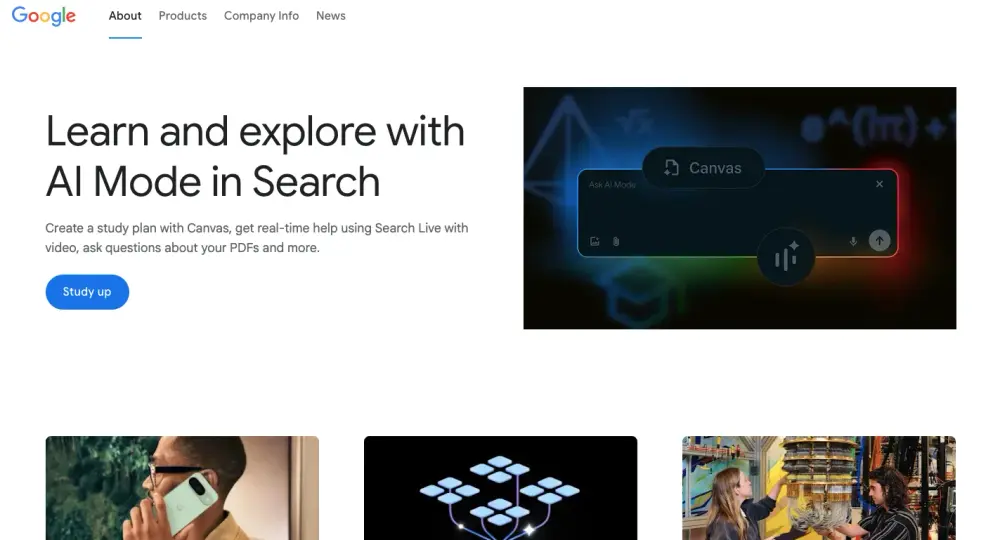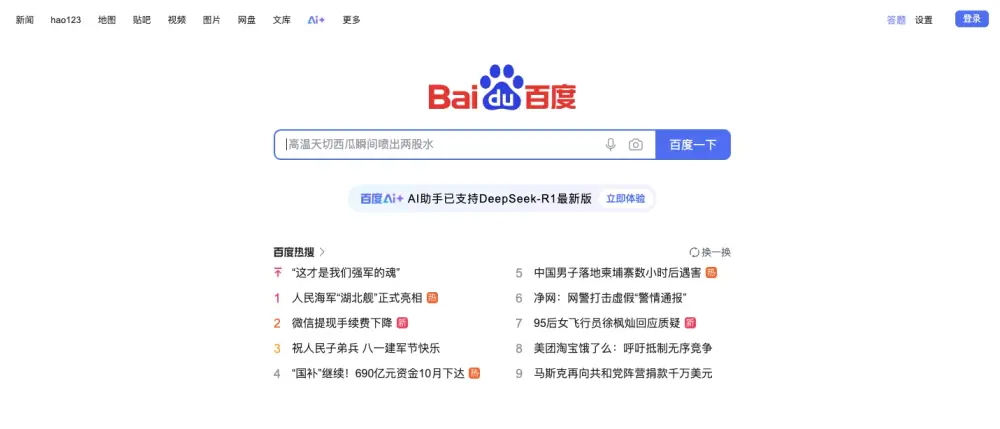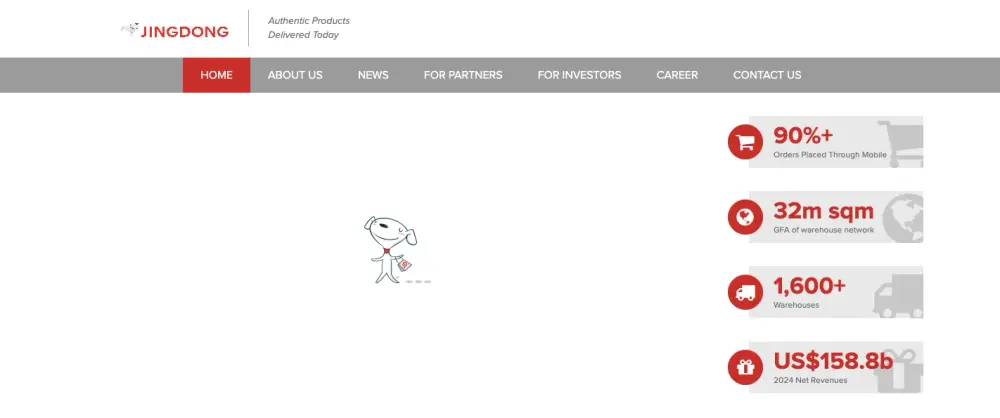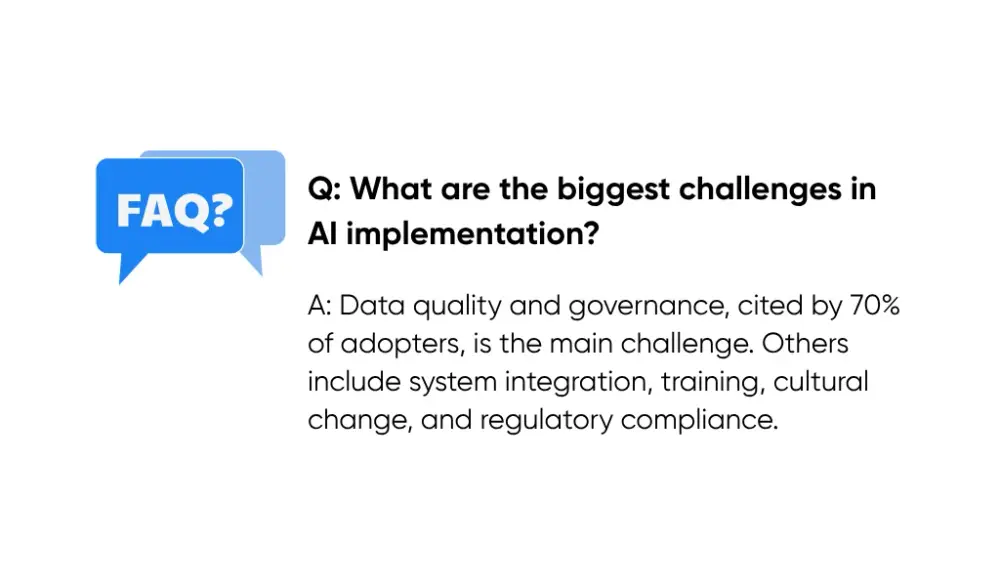11 Companies Using AI Technology and Leading the Way in Adoption

David Pawlan
Co-Founder

Share to AI
Ask AI to summarize and analyze this article. Click any AI platform below to open with a pre-filled prompt.
Companies using AI technology are laying the groundwork for how business is going to be conducted in 2025 and beyond. While tech giants like Microsoft, Google, and Amazon have demonstrated AI's transformative potential through advanced products and machine learning-driven cloud services, the real opportunity lies in how smaller companies adapt these innovations to solve industry-specific challenges and create competitive differentiation.
At Aloa, we’re at the forefront of the push to bring business operations into the AI future. We’ve created a wide range of AI solutions, from customer experience enhancement to real estate. As leaders in AI product development, we stay on top of the latest developments in businesses using AI, so our clients can leverage this cutting-edge technology.
In this blog, we’ll cover 11 companies using AI technology as true pioneers. You’ll find actionable insights from trailblazing efforts in autonomous vehicle tech to innovations that could change the face of shipping and logistics.
Companies adopting AI are setting up to redefine business and daily life as we know it. Let’s find out how.
AI Use and Adoption Among Companies
Artificial intelligence offers limitless possibilities to businesses. Companies using AI technology like machine learning, natural language processing, and computer vision are achieving unprecedented gains in complex problem-solving rates.
These transformative results stem from AI's unmatched data collection, data management, and data processing abilities. Being able to analyze vast amounts of information from various sources allows them to identify patterns humans miss, and make split-second decisions at scale.
Each company has its own unique approaches to AI implementation. Their successes provide blueprints for leveraging AI technology to solve real business challenges.
Top 11 Companies Using AI Technology and Their Innovations
1. Amazon: Revolutionizing E-commerce and Logistics

Amazon's use of AI spans its entire value chain, from customer-facing recommendations to backend logistics optimization.
- AI-powered demand forecasting: Uses deep learning models to predict customer demand patterns across 400+ million products, reducing forecast errors by 50% compared to traditional methods.
- Machine learning algorithms: Optimize inventory placement across fulfillment centers, ensuring products are positioned closest to predicted demand.
- Recommendation engine: Drives 35% of consumer purchases through collaborative filtering and deep learning algorithms.
- Amazon Sequoia: Combines AI, computer vision, and robotics to identify and store inventory 75% faster
- DeepFleet: Amazon’s new gen AI model that coordinates movement across its fleet of 1 million robots, improving travel efficiency by 10% through intelligent traffic management.
These supply chain optimizations result in collective transportation savings of $1.6 billion and one million tons of carbon emissions. 75% of Amazon’s deliveries worldwide are assisted by AI-powered robotics in some capacity. Their pioneering tech can potentially inspire many others in the business world to follow suit, leading to an even smaller global carbon footprint.
2. Google: AI in Search, Advertising, and Beyond

Google applies AI across three main areas: improving search results to understand user intent better, developing self-driving cars through Waymo, and advancing AI research through DeepMind. The search giant processes billions of queries daily using AI to deliver more relevant results, while simultaneously building one of the world's largest autonomous vehicle fleets. The company's key AI implementations include:
- RankBrain: This machine learning search algorithm processes 100% of Google searches and outperforms human engineers by 10% in result quality tests.
- Neural network processing: These networks understand the context and intent of queries that are completely unique, i.e., have not been searched before, which comprises 15% of daily queries.
- Waymo EMMA: Short for End-to-End Multimodal Model, this new technology uses Gemini LLM to simultaneously process multiple data sources (Google Maps + live video data) for autonomous driving.
Google’s fleet has achieved 200,000 paid rides weekly across multiple cities, with over 130 million autonomous kilometers driven. Google has planned $75 billion in AI infrastructure investment for 2025 to keep pressing their competitive edge.
3. Meta Platforms: Content Moderation and Ad Generation

As a major social media platform available in over 190 countries, moderating billions of posts across Facebook and Instagram and delivering millions of personalized ads monthly. AI is helping the company on all those fronts:
- Few-Shot Learner (FSL): Content moderation system operating across 100+ languages, processing billions of posts with automated systems now handling the majority of moderation decisions.
- Adaptive harmful content detection: Adapts to emerging patterns in weeks rather than months, significantly reducing human moderator exposure to disturbing material.
- Advantage+ Creative Suite: Used by 4+ million advertisers (up from 1 million six months prior), generating 15+ million ads monthly.
- AI image generation tools: Deliver 7% increase in conversions for businesses using the technology.
- Andromeda ML system: Powers ad retrieval and personalization through sophisticated multi-modal integration.
- AI digital hosts: These virtual assistants boost off-peak sales conversion rates by 30%.
These AI investments translate to tangible business results. Advantage+ users see an average 22% increase in return on ad spend, while Advantage+ Shopping campaigns alone generate a $20 billion annual revenue run-rate. Meta shows how companies can use AI to both cut costs and drive significant revenue growth simultaneously.
4. Tesla: Pioneering Autonomous Driving

Tesla focuses its AI efforts almost exclusively on developing self-driving capabilities, using data from millions of vehicles on the road to train its neural networks. Unlike competitors who use expensive LiDAR sensors, Tesla relies solely on cameras and AI to navigate, making their approach unique in the autonomous vehicle industry. The company's key AI technologies include:
- Neural network system: The company employs 48 distinct neural networks requiring 70,000 GPU hours to train, outputting 1,000 unique predictions at each timestep.
- Vision-only approach: Their system processes data from eight cameras per vehicle without relying on expensive LiDAR technology.
- Infrastructure investment: Tesla operates 35,000 Nvidia H100 chips with $10 billion cumulative investment by 2024.
- Dojo supercomputer: This custom system features D1 chips with 50 billion transistors each for AI training.
- Real-world data advantage: The company trains its AI on over 3 billion miles of driving data, providing 135x more data than competitors like Waymo. Over 400,000 customers contribute continuous data feedback to improve the system.
Vehicles using Autopilot or Full Self-Driving experience one crash per 6.69 million miles, making them approximately 10x safer than the US average.
5. Baidu: Innovating in Search and Autonomous Vehicles

Baidu, often called "China's Google," applies AI to dominate Chinese search while aggressively expanding into autonomous vehicles. The company serves over 1 billion users through its search engine while operating one of the world's largest robotaxi fleets. The company's major AI implementations include:
- Apollo ADFM: Their Autonomous Driving Foundation Model claims 10x better safety than human drivers.
- Multi-sensor fusion: The system combines LiDAR, cameras, and radar for robust perception (contrasting with Tesla's vision-only approach).
- RT6 robotaxi: Their sixth-generation vehicle achieved 60% cost reduction to $27,670 while maintaining 10 layers of safety redundancy.
Using AI automation solutions, Baidu’s operating costs dropped 30% while growing revenue 9x since early 2023. In February 2025, the company launched 100% autonomous rides across 12 Chinese cities, covering 3,000 square kilometers in Wuhan alone. Baidu completed 1.1 million rides in Q4 2024, representing 36% year-over-year growth.
6. JD.com: AI-Powered Warehouses and Logistics

JD.com, China's second-largest e-commerce company, uses AI to automate nearly every aspect of its warehouse operations, from sorting packages to managing inventory. The company serves over 580 million active customers while operating some of the world's most advanced AI-powered warehouses. The company's key AI technologies include:
- "Asia No.1" intelligent logistics parks: These 40+ facilities feature AI-powered robotics with computer vision-guided robotic arms.
- Machine learning navigation: Autonomous guided vehicles use AI to process 200,000+ orders daily across their network.
- AI-driven sorting systems: These systems can handle 4.5 million parcels per day at the Kunshan facility alone.
- AI-powered procurement: Machine learning optimization has achieved 85% automation rates in procurement processes.
- Container Transport Units (CTUs): Predictive algorithms route inventory efficiently, reducing employee walking from 10+ miles daily to stationary workstations.
- Computer vision quality control: This technology maintains 100% picking accuracy through AI verification.
Using their AI tech, JD leads the industry with warehouse picking efficiency boosts of 300% and average industry turnover of 31.5 days. The company saved $94.7 million by 2022 through these AI implementations. During Singles Day 2024, their AI systems handled 12% more orders faster, processing 98,156 orders on Black Friday alone, a 118% jump from normal capacity.
7. JPMorgan Chase: AI in Finance and Risk Management

JPMorgan Chase, America's largest bank, uses AI primarily to detect fraud and money laundering across its network of 4,700 branches and digital platforms. The bank has also transformed its workforce, requiring new technical skills to work alongside AI systems. The bank's key AI innovations include:
- Proprietary LLMs: Large language models for payment validation operating for 2+ years.
- Graph-based fraud detection: Analyzes user-account interactions beyond simple transaction amounts, achieving 95% reduction in AML false positives.
- Real-time processing: Handles millions of transactions daily with 25% more effective fraud detection compared to traditional methods.
- ChatCFO: Internal AI assistant for finance teams.
- Workforce transformation: Made Python programming a core skill for 320,000+ employees.
- Prompt engineering training: Integrated into standard onboarding processes.
JPMorgan Chase’s AI implementations generate an estimated $1-1.5 billion in value through various use cases. Account validation rejection rates dropped 15-20%, fraud detection false positives fell by 50%, and there were fewer delays in customer interactions.
For finance companies exploring AI, JPMorgan's model shows how partnering with specialized AI providers can accelerate implementation while maintaining strict regulatory compliance.
8. Upstart: Disrupting Traditional Credit Scoring

Upstart uses AI to reimagine how creditworthiness is assessed, looking beyond traditional FICO scores to include factors like education and employment history. This fintech company's AI models analyze over 1,600 data points to make lending decisions, helping banks approve more borrowers while actually reducing default rates. The platform's key AI innovations include:
- Comprehensive data analysis: Evaluates 1,600+ data points beyond traditional FICO scores.
- Alternative data incorporation: Includes education (GPA, field of study), employment history, and behavioral patterns.
- Graph neural networks: Analyze relationships for more accurate risk profiles.
- Real-time decision engines: Process applications instantly with transparent algorithmic frameworks.
- Bias testing: Rigorous testing ensures fair lending across demographics.
- Default prediction accuracy: Improved by 75% compared to traditional models.
At Upstart, 44.28% more people get approved compared to traditional models, with average APRs 36% lower. The system particularly helps underserved communities, approving 35% more Black borrowers at 28.7% lower rates and 46% more Hispanic borrowers at 34% lower rates. Upstart demonstrates that AI can expand access to credit while actually reducing risk in highly regulated industries.
9. Johnson & Johnson: AI for Healthcare Innovation

Johnson & Johnson applies AI across both its pharmaceutical and medical device divisions, using it to accelerate drug discovery and improve surgical outcomes. The healthcare giant analyzes genomic data to identify new drug targets while also developing AI-powered surgical tools that help doctors plan and perform procedures more accurately. The company's major AI implementations include:
- Polyphonic Digital Ecosystem: Analyzes video in real time along with 3D anatomical mapping for surgical applications.
- Surgical planning optimization: Reduces planning time from weeks to days while improving alignment accuracy by 30%.
- AI-accelerated drug discovery: Analyzes vast genomic datasets for target identification.
- Generative AI: Optimizes molecular design in pharmaceutical development.
- Clinical trial optimization: AI-powered site selection and patient recruitment reduce development timelines and costs.
- VELYS AI technology: Used in 43,000+ knee replacement surgeries demonstrating practical deployment at scale.
J&J amplifies their impact through strategic partnerships, including work with NVIDIA on the IGX edge computing platform for surgical applications. The establishment of the Polyphonic AI Fund for Surgery shows their long-term commitment to healthcare innovation. Their approach provides a roadmap for how companies can use AI to tackle complex challenges in highly regulated healthcare environments.
10. Stanford Health Care: Transforming Recruitment and Patient Care

Stanford Health Care uses AI to solve two distinct challenges: streamlining staff recruitment through AI chatbots and helping doctors quickly find specific information in complex medical records. As one of America's leading academic medical centers, Stanford pilots new AI tools carefully before expanding them system-wide. The institution's key AI implementations include:
- Phenom chatbots: Automated recruitment system delivering immediate ROI through reduced recruiter workload and 24/7 candidate support.
- ChatEHR: Proprietary large language model for medical records developed by the Healthcare AI Applied Research Team.
- Instant medical record queries: Enables rapid retrieval of relevant information from complex patient histories.
- Automated patient summaries: Streamlines documentation and handoffs between care teams.
- Transfer eligibility assessments: Accelerates patient placement decisions.
- MedHELM framework: Ensures rigorous AI evaluation and safety protocols.
Stanford takes a measured approach to deployment, starting with 33 clinicians in the initial ChatEHR pilot before expanding to all chart-accessing physicians. At Aloa, we implement a similar balance of innovation and safety. Our healthcare AI solutions integrate directly with EHRs and facilitate clinical-academic collaboration, all while maintaining patient care standards.
11. Mastercard: AI-Based Security and Fraud Prevention

Mastercard operates in over 210 countries and uses AI to spot fraudulent purchases in milliseconds, preventing billions in potential losses. The payment network has invested heavily in AI infrastructure to protect cardholders and merchants alike. The company's major AI implementations include:
- Decision Intelligence Pro: Built on proprietary recurrent neural networks, processes 125 billion annual transactions with 50-millisecond fraud scoring latency.
- Heat-sensing radar approaches: Analyze transaction pathways for anomaly detection.
- Transformer models: Enable the deployment of gen AI capabilities for enhanced fraud prediction.
- Consumer Fraud Risk solution: Predicts compromised cards using partial data, achieving 200% reduction in false positives while doubling detection rates.
- Real-time network analysis: Identifies at-risk merchants 300% faster than traditional methods.
- Infrastructure investment: Upgrades totaling $7 billion over five years have resulted in up to 300% improvement in fraud detection rates.
Mastercard prevents an estimated £100+ million in scams annually for UK markets alone, while partner banks save 20% on fraud assessment costs. Their success demonstrates how payment networks can leverage smart AI implementation and massive-scale data analysis to transform standard security features into competitive advantages.
Conclusion
Companies using AI technology are setting the new standard for what it takes to be competitive. From retail giants automating warehouses to banks preventing fraud in milliseconds, the future of AI is more than content generation and basic data analytics. Amazon's billion-dollar logistics savings and JPMorgan's 95% reduction in fraud false positives prove AI's capacity to solve real business challenges at scale.
With strategic vision and infrastructure investment, you too can harness the transformative power of AI. But act fast; 80% of all business owners are already exploring AI platforms for their daily operations. Those who figure out implementation first are at a much greater advantage than those who have yet to start.
Want to get a leg up on the competition? Aloa’s custom-built AI solutions are developed from the ground up to integrate effortlessly with your existing systems. We gain an in-depth understanding of every nuance and use case of your business to develop fully turnkey software, letting you skip the lengthy trial and error phase. Talk to us today and let’s get started planning your breakthrough into the world of AI.
Frequently Asked Questions
What industries benefit most from AI adoption?
Financial services, e-commerce, healthcare, and automotive industries currently derive the greatest benefits from AI adoption. Financial services achieve 20-300% improvements in fraud detection accuracy, while e-commerce companies like Amazon save billions through logistics optimization.
Healthcare organizations accelerate drug discovery timelines by years and improve diagnostic accuracy. However, AI applications now extend across virtually all industries, from manufacturing quality control to agricultural yield optimization.
How much should companies invest in AI implementation?
AI investment varies significantly based on company size and objectives. Initial pilot projects typically require $100,000-$500,000 for proof-of-concept development and testing. Full-scale implementations range from $1-10 million for mid-sized companies to billions for tech giants like Tesla.
The key is starting with focused pilots that demonstrate ROI, then scaling investment based on proven results. Most successful companies adopting AI follow a portfolio approach, balancing quick wins with long-term strategic initiatives.
What are the biggest challenges in AI implementation?

Data quality and governance represent the primary challenge, cited by 70% of successful AI adopters. Organizations often discover their data is fragmented, inconsistent, or insufficient for training effective models. Integration with existing systems poses technical challenges, while change management requires significant investment in employee training and cultural transformation.
Regulatory compliance, particularly in financial services and healthcare, adds complexity. Successful companies address these challenges through phased implementations, strong governance frameworks, and extensive stakeholder engagement.
How do companies measure AI ROI?
Leading companies establish specific KPIs before AI implementation, focusing on business outcomes rather than technical metrics. Common measurements include cost reduction (operational efficiency), revenue growth (new products/services), risk mitigation (fraud prevention, compliance), and customer service.
Certain use cases call for unique measurements. JPMorgan measures fraud detection through false positive rates and prevented losses. Amazon tracks fulfillment costs and delivery times. Successful measurement requires baseline establishment, continuous monitoring, and willingness to iterate based on results.
Should companies build or buy AI solutions?
The build-versus-buy decision depends on strategic importance, internal capabilities, and competitive differentiation needs. Companies like Google and Tesla build proprietary systems for core competitive advantages but may purchase specialized tools for non-critical functions.
Most organizations benefit from a hybrid approach: partnering with specialized AI development providers for initial implementation while building internal capabilities over time. Key considerations include data sensitivity, customization requirements, speed to market, and long-term strategic value of AI capabilities.